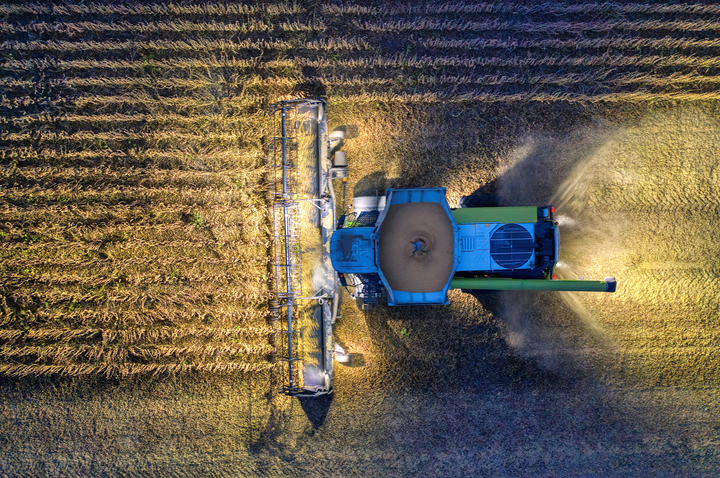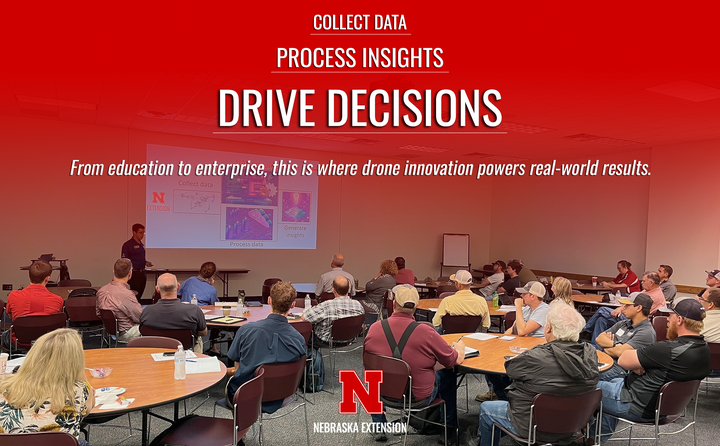
Precision agriculture (PA) information found throughout this site is designed for crop producers, agricultural consultants, extension educators and other agricultural professionals.
Numerous economic and environmental benefits may be realized by strategically applying PA management principles including:
- Enhanced product quality.
- Increased agricultural profitability and sustainability.
- Protecting the environment.
- Optimized use of agricultural pesticides, fertilizers, seeds, water, energy and other crop amendments.
- Improving the well-being of those who depend upon Nebraska agriculture.
Training Opportunities

Part 107 Remote Pilot Exam Prep Course
Nebraska Extension annually offers the Part 107 Remote Exam Prep Course — a one-day class for producers, ag industry stakeholders and others interested in flying drones for commercial or public application, including emergency management, law enforcement, real estate and land management, photography and agriculture. This eight-hour course is $275, with discounts for eligible students and educators and corporate/business groups.
For more information or questions, contact Dr. Dirk Charlson at (402) 460-0742 (cell).
| City | Date | Location |
|---|---|---|
| Central City | Friday, Feb. 6 | Merrick County Extension Office, 1784 Fairgrounds Rd., Central City, NE 68826 |
| Geneva | Friday, Feb. 13 | Fillmore County Extension Office, 1340 G St., Geneva, NE 68361 |
| Fremont | Friday, Feb. 20 | Dodge County Extension Office, 1206 W. 23rd St., Fremont, NE 68025 |
| Sidney | Wednesday, March 4 | Cheyenne County Extension Office, 920 Jackson St., Sidney, NE 69162 |
| Concord | Thursday, March 12 | Haskell Ag Lab, 57905 866 Rd., Concord, NE 68728-2828 |
| Kearney | Friday, March 20 | Buffalo County Extension Office, 1400 E 34th St., Kearney, NE 68847 |
| Auburn | Friday March 27 | Nemaha County Extension Office (Courthouse), 1824 N St. #102, Auburn, NE 68305 |
| Grand Island | Friday, April 10 | Hall County Extension Office, 3180 US-34, Grand Island, NE 68801 |
| Omaha | Thursday, April 16 | Douglas-Sarpy County Extension Office, 8015 W. Center Rd., Omaha, NE 68124 |
| Lexington | Friday, April 24 | Dawson County Extension Office, 1002 Plum Creek Pkwy., Lexington, NE 68850 |
| Omaha | Thursday, May 7 | Douglas-Sarpy County Extension Office, 8015 W. Center Rd., Omaha, NE 68124 |
| Grand Island | Friday, May 22 | Hall County Extension Office, 3180 US-34, Grand Island, NE 68801 |
| Grand Island | Friday, June 12 | Hall County Extension Office, 3180 US-34, Grand Island, NE 68801 |
| Ord | Friday, June 19 | Valley County Extension Office, 801 S St., Ord, NE 68862 |
| Lincoln | Friday, June 26 | Nebraska Extension of Lancaster County Office, 444 Cherrycreek Rd. Suite A, Lincoln, NE 68528 |
| Grand Island | Friday, July 10 | Hall County Extension Office, 3180 US-34, Grand Island, NE 68801 |
| Alliance | Friday, Aug. 7 | Knight Museum and Sandhills Center, 908 Yellowstone Ave, Alliance, NE 69301 |
| Grand Island | Friday, Aug. 14 | Hall County Extension Office, 3180 US-34, Grand Island, NE 68801 |
| Lincoln | Friday, Aug. 21 | Nebraska Extension of Lancaster County Office, 444 Cherrycreek Rd. Suite A, Lincoln, NE 68528 |
| Grand Island | Friday, Sept. 11 | Hall County Extension Office, 3180 US-34, Grand Island, NE 68801 |
| Omaha | Thursday, Sept. 17 | Douglas-Sarpy County Extension Office, 8015 W. Center Rd., Omaha, NE 68124 |
| Grand Island | Friday, Oct. 9 | Hall County Extension Office, 3180 US-34, Grand Island, NE 68801 |
| Omaha | Thursday, Oct. 22 | Douglas-Sarpy County Extension Office, 8015 W. Center Rd., Omaha, NE 68124 |
| Lincoln | Friday, Nov. 6 | Nebraska Extension of Lancaster County Office, 444 Cherrycreek Rd. Suite A, Lincoln, NE 68528 |
| Grand Island | Friday, Nov. 13 | Hall County Extension Office, 3180 US-34, Grand Island, NE 68801 |
| Curtis | Friday, Nov. 20 | Nebraska College of Technical Agriculture, 404 E. Seventh St., Curtis, NE 69025 |
| Grand Island | Friday, Dec. 4 | Hall County Extension Office, 3180 US-34, Grand Island, NE 68801 |
| Lincoln | Friday, Dec. 11 | Nebraska Extension of Lancaster County Office, 444 Cherrycreek Rd. Suite A, Lincoln, NE 68528 |

Annual Nebraska Ag and Spray Drone Conference
The Nebraska Ag and Spray Drone Conference is the Midwest’s largest event dedicated to drone technology in agriculture. While the 2025 event has concluded, Nebraska Extension is currently making preparations for the 2026 conference. For more information, visit the conference homepage.
Contact:
Dirk Charlson
Statewide Digital Ag Extension Educator
(402) 460-0742
dirk.charlson@unl.edu
Faculty Bio

Contact:
Samantha Daniel
Extension Educator
(308) 352-4340
samantha.daniel@unl.edu
Faculty Bio


See our drone article section for more information on extension training, workshops & research
Site Specific Crop Management Components:
Satellite-Based Auto-Guidance - Satellite-based auto-guidance systems can provide significant benefits for the crop production industry. Improved equipment make it possible to use satellite-based auto guidance in diverse growing environments.
Yield Monitoring and Mapping - Yield mapping refers to the process of collecting georeferenced data on crop yield and characteristics, such as moisture content, while the crop is being harvested. Various methods, using a range of sensors, have been developed for mapping crop yields.
On-the-Go Vehicle-Based Soil Sensors - Sensors can measure a variety of soil properties. These sensors are used in conjunction with GPS to develop field maps or to control variable rate application equipment in real-time.
Site-Specific Management of Soil pH - A series of frequently asked questions (FAQs) are addressed.
Soil Sampling for Precision Agriculture - Soil sampling is an important component of a site-specific management system. Sampling principles and recommendations are discussed.
Site-Specific Nitrogen Management for Irrigated Corn - Recent research in site-specific nitrogen management and recommendations for how irrigated corn producers in Nebraska might implement this technology on their farms

Precision Ag Resources
Glossary
ActiveSync - Microsoft ActiveSync is a synchronization software for Windows Mobile-based Pocket PCs. The software is used for data transfer between desktop PCs and PDAs.
As-applied map - Is a map containing site-specific information about the location and rate of application for fertilizer or chemical input. Usually created with a GPS equipped applicator and data logger.
Atomic clock - The world’s most accurate clock. Each GPS satellite has an atomic clock on-board, which is used by GPS receivers to calculate position.
Attribute - A characteristic that describes a Feature. Attributes are pieces of information that describe a point, line, or polygon.
Autonomous operation - Vehicle guidance without the need for human intervention. A tractor may be driven by a series of on-boards sensors and GPS for precision driving without damage to crops.
Backup - A computer backup is a duplicate set of data that can be used to retrieve files in the event of data loss. Backups are often stored using CD-R, DVD, or USB external hard drives.
Base station - Also called a reference station, is a receiver located at a surveyed benchmark. The base station calculates the error for each satellite and through differential correction, improves the accuracy of GPS positions collected at unknown locations by a roving GPS receiver.
Card reader - A device that reads removable memory cards such as Secure Digital, Smart Media, CF, and Memory Sticks. Usually connects to PC using an USB port.
CD-R - A recordable compact disc. Most CD-R discs hold up to 650 MB. Can be used for moving large amount of data or as a data backup.
Coast Guard Beacon - Coast Guard Beacon is a differential correction source for GPS. The Coast Guard built the system for maritime navigation. The signal is ground-based and generally available throughout the United States, but may be limited in some areas. The signal is free, but requires a special GPS antenna.
Com port - Communication port is used to connect electronic devices to a computer. It is a 9-pin connector called DB-9.
Compact flash (CF) card - A CF card is a small removable mass storage device. Used as non-volatile memory in digital cameras and PDA devices.
Constellation - Refers to either the specific set of satellites used in calculating positions or all the satellites visible to a GPS receiver at one time.
Coverage - A vector data format for storing the location, shape, and attributes of geographic features. A coverage usually represents a single theme such as soils, streams, roads, or land use. It is one of the primary vector data storage formats for ArcInfo. A coverage stores geographic features as primary features (such as arcs, nodes, polygons, and label points) and secondary features (such as tics, map extent, links, and annotation). Associated feature attribute tables describe and store attributes of the geographic features.
Data logger - Used to store electronic data sent by a measurement device. A yield monitor is an example of a data logging device.
Datum - A set of parameters and control points used to accurately define the three-dimensional shape of the earth. The datum defines part of a geographic coordinate system that is the basis for a planar coordinate system. For example, the North American Datum for 1983 (NAD83) is the datum for map projections and coordinates within the United States and throughout North America.
Digital Elevation Model - DEM - depicts landscape elevation. The data are developed by the USGS at either 10-meter or 30-meter grid spacing. Often used in a GIS as a data layer.
Differential Global Positioning System (DGPS) - is a technique used to improve GPS accuracy. See differential correction.
Differential correction - A technique used to improve GPS accuracy. Differential correction signals remove or reduce errors associated with atmospheric effects and other positioning errors. The correction signal can be land-based or satellite-based. Common sources of differential correction include WAAS, Omnistar, and Coast Guard Beacon.
DOQ - digital orthophoto quadrangle (DOQ) is an aerial photograph. It has been orthorectified--altered so that it has the geometric properties of a map; DOQ's meet National Map Accuracy Standards. Thus the user can measure distances accurately on a DOQ.
DVD - A digital media source capable of storing large amounts of data. Is a common format for movies, but is also used for computer data storage. Each DVD can hold up to 4.7 GB of data.
e00 - ArcInfo interchange format used to transfer coverages. The data must be converted prior to use in a GIS system.
Expansion pack - Is a sleeve that slides on to IPAQ PDA device. The expansion pack may contain extra battery power, memory slots or other enhancing features.
Fix - A single position calculated by a GPS receiver with latitude, longitude, altitude, time, and date.
Geographic coordinate system - A reference system using latitude and longitude to define the locations of points on the surface of a sphere or spheroid.
Geostationary satellite - A satellite positioned approximately 35,700 km above the earth’s equator. At this altitude the satellite orbits as fast as the earth rotates on its axis, so it remains effectively stationary above a point on the earth. Satellite-based differential correction satellites are geostationary.
Geosynchronous satellite - A satellite moving west to east whose orbital period is equal to the earth’s rotational period. If the orbit is circular and lies in the plane of the equator, the satellite will remain over one point. Otherwise it will appear to make a figure eight once a day between the latitudes that correspond to its angle of inclination over the equator. The constellation for GPS is geosynchronous.
GeoTiff - GeoTIFF refers to TIFF files, which have geographic data embedded within the TIFF file. The geographic data can then be used to position the image in the correct location and geometry on the screen in a geographic information system.
GIS (Geographic Information System) - A computer based system that is capable of collecting, managing and analyzing geographic spatial data. This capability includes storing and utilizing maps, displaying the results of data queries and conducting spatial analysis.
GPS (Global Positioning System) - Global Positioning System is a constellation of 24 satellites, developed by the U.S. Department of Defense, which are used to calculate your position anywhere on earth.
Grain flow dynamics - Refers to the grain flow through the harvest machine. Grain flow dynamics result in errors relating to grain mixing, delayed measurement and resulting positional errors in yield mapping systems.
JPEG - JPEG is a standardized image compression mechanism used to reduce file size. JPEG stands for Joint Photographic Experts Group. JPEG is designed for compressing either full-color or gray-scale images. Often used for internet delivery of aerial photography.
JPW - JPEG World file (JPW) contains coordinate information used to position an image with respect to a coordinate system. JPEG World File format is supported by most GIS software packages. However, the JPW file does not contain projection information and care should be taken to ensure that the coordinate system is the same as other data layers in a GIS system.
Latitude - A north/south measurement of position perpendicular to the earth's polar axis.
Lightbar - Is a navigation tool coupled with a GPS designed to keep the driver on-course. Applications include planting and fertilizer applications to reduce skips and overlaps. Typically, guidance is provided through as series of LED lights.
Line - A shape having length and direction but no area, connecting at least two x, y coordinates. Lines represent geographic features too narrow to be displayed as an area at a given scale, such as contours, street centerlines, or streams, or linear features with no area such as state and county boundary lines.
Longitude - An east/west measurement of position in relation to the Prime Meridian, an imaginary circle that passes through the north and south poles.
Memory stick - A memory stick is a small removable mass storage device about the size of a stick of gum. Used as non-volatile memory in digital cameras and other electronics made by Sony Corporation.
Map Projection - A mathematical formula that transforms feature locations between the earth's curved surface and a map's flat surface. A projected coordinate system includes the information needed to transform locations expressed as latitude and longitude values to x, y coordinates. Projections cause distortions in one or more of these spatial properties--distance, area, shape, and direction.
Mass flow sensor - Is a sensor that measures grain flow in a yield monitor system.
MHz - In computers, is a measure of processor speed. Higher numbers reflect a faster computer processor.
Moisture sensor - Is a sensor that measures grain moisture in a yield monitor system.
Multimedia card - A multimedia card is a small removable mass storage device. Used as non-volatile memory in digital cameras and PDA devices.
Multipath - Interference caused by reflected GPS signals arriving at the receiver, typically as a result of nearby structures or other reflective surfaces.
NAVSTAR - an acronym for NAVigation Satellite Timing and Ranging. NAVSTAR satellites comprise the GPS constellation.
NeATA - Nebraska Agricultural Technologies Association
NMEA - National Marine Electronics Association (NMEA) develops standards for communication protocols. The NMEA interface standard defines electrical signal requirements, data transmission protocol and time, and specific sentence formats. GPS receivers output data using the NMEA 0183 protocol.
Omnistar - A subscription based differential GPS source. Omnistar is a satellite-based DGPS source that requires a special GPS antenna.
Operating system - Every general-purpose computer must have an operating system to run other programs. Operating systems perform basic tasks, such as recognizing input from the keyboard, sending output to the display screen, keeping track of files and directories on the disk, and controlling peripheral devices such as disk drives and printers.
PDA - Personal Digital Assistant (PDA) are small portable computers, usually handheld or pocket size, that organize data, such as your schedule, appointment calendar, address book, and to-do list. They are also used for GPS navigation and GIS data collection.
PDOP - An indicator of satellite geometry for a constellation of satellites used to determine position. Positions with a higher PDOP value generally constitute poorer measurement results than with lower PDOP value.
Pixel - A pixel is an individual cell in a matrix that comprises a raster dataset. See Raster.
Point - A single x, y coordinate that represents a geographic feature too small to be displayed at as a line or polygon at a specific scale.
Polygon - A two-dimensional closed figure with at least three sides that represents an area.
Processor - A silicon chip that contains a CPU. In the world of personal computers, the terms microprocessor and CPU are used interchangeably. At the heart of all personal computers is a microprocessor. Microprocessors also control the logic of almost all digital devices, from clock radios to fuel-injection systems for automobiles.
Projection - See map projection.
RAM - Acronym for random access memory, a type of computer memory that can be accessed randomly; that is, any byte of memory can be accessed without touching the preceding bytes. RAM is used as temporary memory used to quickly access commonly used files.
Raster - Represents any data source that uses a grid structure to store geographic information. Common examples include remotely sensed data like satellite imagery, scanned data, and photographs.
Re-project - Is the process of converting a map from one map projection to a different map projection. For example, Lat/Long to UTM coordinates.
ROM - Acronym for read-only memory, computer memory on which data has been prerecorded. Unlike RAM, ROM retains its contents even when the computer is turned off. ROM is referred to as being nonvolatile, whereas RAM is volatile.
Rover - Any mobile GPS receiver collecting data during a field session.
RTK - Real-Time Kinematic is a high-end GPS capable of centimeter level positional accuracy.
Scale - The ratio or relationship between a distance or area on a map and the corresponding distance or area on the ground.
Secure digital (SD) card - a small removable mass storage device. Used as non-volatile memory for digital cameras and PDA devices.
Selective availability (SA) - A method of intentional accuracy degradation by the Department of Defense (DoD). With SA turned on GPS accuracy reduced to 100 meters. Selective availability has been turned off as of May 2, 2000. The DoD has no plans to turn SA on in the future. Instead other methods of GPS access will be employed.
Shapefile - A vector data format for storing the location, shape, and attributes of geographic features. A shapefile is stored in a set of related files and contains one feature class, point, line or polygon.
Smart media - Is a small removable mass storage device. Used as non-volatile memory for digital cameras.
Spatial data - Information about the locations and shapes of geographic features; Any data that can be mapped.
SSURGO - Soil Survey Geographic (SSURGO) Database. It is a digital version of the NRCS soil books. Each soil type is represented as a polygon and tied with associated soil type properties.
Synchronize - Synchronizing two devices refers to an exact duplicate between the PDA and PC. If one unit has files newer than the other unit, software will update each unit.
Tabular data - Descriptive information that is stored in rows and columns and can be linked to map features.
TFW - TIFF World file (TFW) contains coordinate information used to position an image with respect to a coordinate system. TIFF World File format is supported by most GIS software packages. However, the TFW file does not contain projection information and care should be taken to ensure that the coordinate system is the same as other data layers in a GIS system.
TIFF - an acronym for Tag(ged) Image File Format. It is one of the most popular and flexible of the current public domain raster file formats. Commonly used in aerial photography and satellite imagery.
Tiger - Topologically Integrated Geographic Encoding and Referencing system - the name for the digital database developed at the U.S. Census Bureau to support its mapping needs for the Decennial Census and other Bureau programs. Data sets include political boundaries, demographics, roads, stream networks.
Unprojected map - A map that is not projected to a coordinate system. Refers to data containing latitude and longitude coordinates.
USB - Communication protocol known as Universal Serial Bus. Commonly used for computer peripherals such as printers, keyboards, scanners, and digital cameras. USB devices allow for hot-swappable capability without restarting the computer to recognize a connected device.
UTM - Universal Transverse Mercator - UTM is a projected coordinate system that divides the world into 60 north and south zones, six degrees wide.
Vector - A coordinate-based data structure commonly used to represent linear geographic features. Features are stored as points, lines, and polygons.
WAAS - Wide Area Augmentation System (WAAS) is a differential correction source for GPS. The FAA built the system for aviation navigation. The signal is satellite-based and only available in the United States. The signal is free and can be used with any WAAS-enabled GPS receivers. No special GPS antenna required.
Yield calibration - Procedures used to calibrate a yield monitor for specific harvest conditions such as grain type, grain flow, and grain moisture.
Yield mapping - Is a yield monitor coupled with a GPS. Each yield reading is tagged with a latitude and longitude coordinates, which is then used to produce a yield map.
Yield monitor - A yield-measuring device installed on harvest machines. Yield monitors measure grain flow, grain moisture, and other parameters for real-time information relating to field productivity.
UNL Extension Publications
Adobe Acrobat Reader is required to read these articles in pdf format. Free Adobe Acrobat Reader download
Agricultural Sprayer Automatic Section Control (ASC) Systems - EC 718 (2 MB; 6 pages)
These systems utilize GPS to reduce over-application of chemicals in the field. Boom sections are turned off over previously treated areas or in "no spray zones" determined by the operator. Substantial savings can be realized, especially in irregularly shaped fields.
Best Management Practices for Collecting Accurate Yield Data and Avoiding Errors During Harvest - EC 2004 (1.8 MB; 6 pages)
Collecting accurate yield monitor data is critical for producers who plan to adopt site-specific crop management strategies for their operations. This publication, part of the precision agriculture series, explains basic information to be used by the combine operator during harvest to improve the quality of yield data collected during harvest.
Site-Specific Nitrogen Management for Irrigated Corn - EC 163 (466 KB; 8 pages)
Describes several approaches to site-specific nitrogen management including data collection, soil sampling and nitrogen recommendations as well as a history and economic analysis of the practice.
Weed Targeting Herbicide Management - EC708 (358 KB; 6 pages)
Site-specific weed management and herbicide application is an effective way to minimize herbicide costs, maximize weed control and prevent unnecessary environmental waste. This publication, part of the precision agriculture series, explains basic principles of site-specific weed control.
Satellite-Based Auto-Guidance - EC706 (873 KB; 6 pages)
Satellite-based auto-guidance systems can provide significant benefits for the crop production industry. Improved equipment make it possible to use satellite-based auto guidance in diverse growing environments.
Listening to the Story Told by Yield Maps - EC704 (362KB; 8 pages)
Yield mapping refers to the process of collecting georeferenced data on crop yield and characteristics, such as moisture content, while the crop is being harvested. This EC explains more about how to acquire and use this precision agriculture tool.
Applications of Remote Sensing in Site-Specific Management - EC702 (165 KB; 6 pages)
Remote sensing is another tool the precision agriculture specialist uses to collect data. This EC talks about aerial, satellite, imagery data sources, and other elements.
On-the-Go Vehicle-Based Soil Sensors - EC178 (181 KB; 4 pages)
Sensors can measure a variety of essential soil properties. These sensors can be used to control variable rate application equipment in real-time or in conjunction with a Global Positioning System to generate field maps of particular soil properties.
Untangling the GPS Data String - EC157 (169 KB; 4 pages)
Illustrates a way to convert GPS receiver output into linear units for georeferenced data analysis.
Soil Sampling for Precision Agriculture - EC154 (154 KB; 4 pages)
Provides direction on how to implement a soil sampling program for precision agriculture.
Site-Specific Management of Soil pH (FAQ) - EC705 (289 KB; 6 pages)
Addresses several frequently asked questions related to the meaning of soil pH, lime requirement, and quality of data used to prescribe site-specific management of soil pH.
Software Tools
Yield Editor is a tool which allows the user to select, apply and analyze a variety of automated filters and editing techniques used to process and clean yield data. (University of Missouri - ARS)
Yield Check is software for screening geo-referenced yield monitor data. It detects six common types of erroneous yield monitor values:
- combine header status up,
- start-/end-pass delays,
- grain flow, distance traveled, and grain moisture outliers,
- values exceeding minimum and maximum biological yield limits,
- local neighborhood outliers, and
- short segments and co-located points.
Erroneous values are either deleted or flagged for further analysis to identify where they have occurred in the field. The output file can then be used in other commercial mapping software to create a yield map or maps of the different categories of erroneous yield values. (University of Nebraska-Lincoln)
FOViewer (MapShots) can be used to process yield maps from several yield monitoring products.
Powerpoint Presentations
Tutorials
Industry Links
AGCO
Ag Leader
AutoFarm
Case IH
Cornerstone Mapping
ESRI
Farm Works
Garmin
Hinkson Land Tech
John Deere
Manifold
MapShots
Outback Guidance
Precision Ag
Raven Controls
Red Hen Systems
SST
TeeJet Technologies
Trimble
Veris Technologies
Mention or display of brand names is for identification purposes only. No endorsement or criticism is intended for those mentioned or any equivalent products not mentioned.
